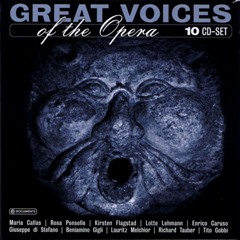Great Voices of the Opera (2011) CD3 - Kirsten Flagstad
Great Voices of the Opera (2011) CD3 - Kirsten Flagstad

3-1 –Kirsten Flagstad Fidelio: Abscheulicher! Wo Eilst Du Hin? 7:37 3-2 –Kirsten Flagstad Oberon: Ozean, Du Ungeheuer 8:18 3-3 –Kirsten Flagstad Ah! Perfido 13:12 3-4 –Kirsten Flagstad Lohengrin: Einsam In Trüben Tagen 4:56 3-5 –Kirsten Flagstad Tannhäuser: Allmächt'ge Jungfrau 7:24 3-6 –Kirsten Flagstad Im Kahne 3:19 3-7 –Kirsten Flagstad Ich Liebe Dich 3:21 3-8 –Kirsten Flagstad Ein Traum 2:46 3-9 –Kirsten Flagstad Songs My Mother Taught Me 2:49
Born into a musical family (her father was a conductor, her mother a pianist and vocal coach), Kirsten Flagstad studied music from an early age and made her debut while still a student as Nuri in d'Albert's Tiefland in 1913. For the following 18 years, she sang only in the Scandinavian countries in such works as Der Freischütz and Die Fledermaus (the role she performed most often in her career). In 1932, she sang her first Isolde in a guest performance in Berlin. This led to an audition at Bayreuth where she sang Sieglinde and Gutrune in 1934. She attained overnight worldwide recognition after her February 2, 1935, Metropolitan Opera debut as Sieglinde and her Isolde four days later. By April 17 of that year, she had also sung Brunnhilde in both Die Walküre and Götterdämmerung, Elsa in Lohengrin, Elisabeth in Tannhäuser and Kundry in Parsifal. From that time, she was regarded by many to be the best Wagnerian soprano in the world, although her rivals included Fieda Leider, Marjorie Lawrence, and Helen Traubel. In 1936 and 1937, she sang Isolde, Brunnhilde, and Senta in London to great acclaim. During this period she also sang at San Francisco, Chicago, and Buenos Aires.
In 1941, Flagstad returned to Norway to be with her husband, which led to rumors that she was a Nazi sympathizer. However, the only appearances she made outside of Norway were in Switzerland. She never sang for Nazi officials at any time. Her husband, who had business dealings with the occupation forces as well as the resistance, was arrested after the war, and she was forced to overcome hard feelings held by many. Her first major appearances were in London singing Isolde and Brunhilde. She sang four seasons at the Royal Opera, Covent Garden, and then appeared in a fabled production of Purcell's Dido and Aeneas at the Mermaid Theater. She returned to the Metropolitan Opera in 1950 and during her final seasons there sang Brunhilde, Isolde, Fidelio, and the title role in Gluck's Alceste, the role of her farewell. In 1949 and 1950, she appeared in Fidelio at the Salzburg Festival, her only appearances there.
In 1950, she sang the world premiere of the Four Last Songs by Richard Strauss in London under the direction of Wilhelm Furtwängler, who led many of her greatest performances and recordings. Throughout her career, she gave recital tours bringing to the public many fine songs by Scandinavian composers, especially Sibelius and Grieg. Her concert repertoire ranged from the Beethoven Missa Solemnis and Rossini's Stabat mater to songs of Schubert, Brahms, and Mahler. After her retirement from the opera stage, she continued to appear in recital and concert until 1957. Her last appearance in the United States came in a benefit concert for the Symphony of the Air. After her retirement, she continued to make recordings, including a highly acclaimed performance of Fricka in the first complete recording of Wagner's Das Rheingold, and in 1958 was named general manager of the new Norwegian National Opera.
The voice of Kirsten Flagstad was a full dramatic soprano with great warmth. Unlike the voice of Birgit Nilsson, which was like a laser beam, Flagstad's voice enveloped the listener in a cushion of sound. She brought her characters to life primarily through vocal means; the overt theatricality of the later 20th century was not part of her dramatic arsenal nor was it seen in any of her colleagues. Her many appearances with Lauritz Melchior at the Metropolitan Opera and at other houses in the 1930s made the music dramas of Wagner the core of the repertoire at these houses. ---Richard LeSueur, allmusic.com
download (mp3 @320 kbs):
yandex mediafire uloz.to cloud.mail.ru gett








